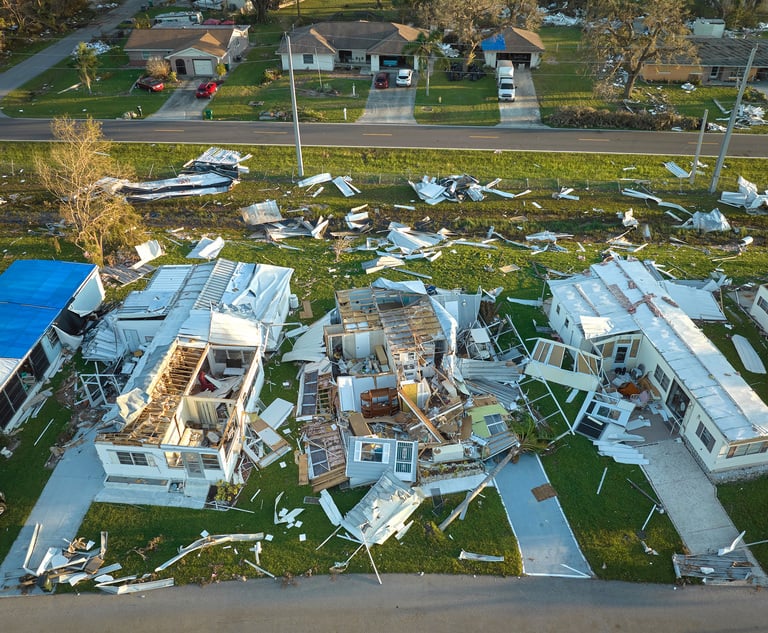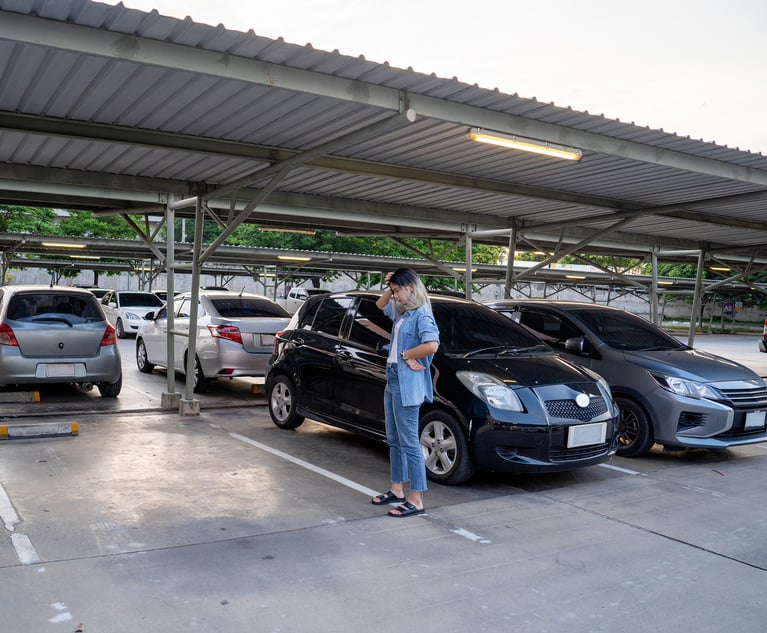Like many who suffered through Hurricane Katrina and itsaftermath, independent agents often ended up in as bad a shape astheir policyholders. Take David Treutel Jr., who lost hisMississippi home and office while seeing his Bay St. Louiscommunity virtually obliterated.
|In trying to reassemble his own personal and professional life,Mr. Treutel–like many agents across the Gulf region–faced the addedburden of fulfilling the promise every insurance agent makes toclients by being there to help policyholders become wholeagain.
|The Treutel Insurance Agency is a third-generation business withnearly a 50-50 split between commercial and personal lines,generating about $1.3 million in revenue. The agency's nineemployees worked in an office on a bluff in a portion of town thatnever experienced flooding in all of its recorded history,explained Mr. Treutel, the agency's owner and president.
|Last Aug. 26, the office prepared for Katrina–which at the timewas expected to hit Florida, he remembered. Equipment was secured,office furniture moved, and the agency catastrophe plan put inmotion. Under the plan, everyone expected to be back in the officeafter the storm passed to begin processing claims.
|The agency's computer back-up records were secured in threeseparate locations–the office, the Treutel home and a safetydeposit box at the local bank. “On an impulse, I took the officeback-up with me,” he said. “It was the smartest thing I everdid.”
|His wife, Angelyn, the agency's vice president, was in Texasattending a conference. Normally, he would have stayed in his homethrough the storm, but his father-in-law needed to be moved. Aftersome coaxing, Mr. Treutel, along with his teenage son, moved hisfather-in-law to stay with relatives 15 miles inland on higherground. By the time they reached their destination, Katrina wasraging, and they hunkered down to wait out the storm.
|As Katrina passed, Mr. Treutel made several attempts to get backhome, but high water and debris made roads impassable. Seven milesinland he found the highway covered with eight feet of standingwater.
|When he tried again the following day, he was greeted with totaldevastation. Debris, mud and cars were piled all over. A trip downMain Street took 30 minutes. He located the other members of hisfamily who survived the storm, happy to be alive. His home wassaturated by 12 feet of water. In the 80-degree heat, there was nofresh water, ice, power or telephones. It would be several daysbefore there would be any water or ice.
|“Five people drowned within a block of my home,” he said. “Weput the body bags on the side of the road.”
|At the office, on the bluff that had never seen flooding, therewas a hole in the roof and about seven feet of water caused by thestorm surge from the town's back bay. The office–and everything init–was destroyed.
|“The first couple of nights were the worst,” he said.
|Among his family, the storm took eight homes and 15 vehicles.Fortunately, his in-laws came to their rescue, driving a caravaninto town to take members out and set up housing in Mobile,Ala.
|It would be four days before Angelyn Treutel arrived from Texas,bringing with her a generator and other supplies to get thingsrunning again. In the whole time, she had no communication with herhusband.
|Within days the Treutel Agency set up operations under a tent.Mr. Treutel spray-painted the side of the office telling clients ofthe new location. “They came to us in the hundreds, looking likezombies,” he related.
|Among his 9,000 policyholders, there were 8,000 claims. For fivemonths, Mr. and Mrs. Treutel, his father (David Treutel Sr., theretired scion), and all but two of his staff handled customers,working under the tent, then calling in the claims information tocarriers while on the four-hour drive to Mobile, where they hadsecured an apartment. What was not finished when they arrived homewas filed using a laptop, ending the workday around midnight. “Wedid that for about five months,” he said.
|Hurricane Rita, a few weeks later, made her mark, blowing thetent down. It would be three months before they could secure atrailer, and not until January before they opened a new office inan actual building, including telephone service.
|During those months, it was the help of some carriers and fellowagents that helped get them through their ordeal.
|Safeco was one of the first to get people on the ground to help,Mr. Treutel noted. He said the company put air cards in theirlaptops and furnished satellite phones. The company also providedcall center support. St. Paul Travelers and Progressive pitched inby furnishing cell phones. Zurich and American InternationalGroup's Lexington also provided support and assistance.
|He credited Afni's “CSR 24″ system with allowing customers tocall his office number, which was disconnected, then having themessages relayed to the agency over their cell phones.
|Their agency management system vendor, AMS, restored theagency's information to a laptop within a couple of weeks. Mr.Treutel noted his fortuitous decision to take the back-up with him,because not only was the back-up in his home destroyed, but thebank with the third copy was flooded and destroyed as well.
|Agents from Florida and Mississippi also arrived to lend a hand,and agents in Texas made donations.
|However, other companies were simply unprepared, he said. Insome cases, a service representative refused to take claiminformation verbally, saying it had to be faxed. Only when theTreutels spoke to upper-level managers who grasped the severity ofthe situation, and the reality that there were no fax machines tobe had, did the company alter its policy.
|“Some companies were flexible and imaginative, and some werenot,” he said. “We had to get to authority to get through.”
|There was also a lot of difficulty with the excess and surpluslines market, he said, complaining that communication was slow.
|No matter how helpful, no company was fully prepared for thedisaster, he went on to say, noting a wide disparity inperformance. Even Safeco appeared to be surprised at how long ittook to take care of the claims, he pointed out. “Some companiesdid not help our agents,” he said. “They need cat-response teamsthat know how to help.”
|Claims management was also a major problem, he said, citing ashortage of experienced adjusters. The region was totallydevastated, with much of the infrastructure–including signage–gone.Adjusters lacked GPS devices to help them find the locations ofproperties.
|Many adjusters came into town, only to leave after a few weeks.Policyholders, looking for answers, had no adjuster to turn to. Anadded burden was that separate coverages required separateadjusters, which added to the strain, he noted.
|Katrina's effects are lingering eight months after the hurricanehit. It will be two years before one of the state's majorinterstate bridges is repaired. There are still food tents set upby faith-based organizations to feed and support residents. Of the15 gas stations in the area, only three are working. There is nomajor grocery store within 30 miles of town.
|The labor force is growing as rebuilding progresses, but thereare no homes to house them. Affordability will be a major issue,Mr. Treutel pointed out, since the median income in the state is$40,000.
|There is also the long-term effect on mental health from thestress of the past hurricane season, and worries about the one soonto come. Tens of thousands are living in FEMA trailers that are notbuilt to withstand a hurricane or flood.
|Professionally, Mr. Treutel said his biggest fear is companieshave not learned their lessons from Katrina, and that peoplebelieve things are back to normal. “There's a perception that thereis no need here, but there still is a lot of need,” he added.
|More company executives need to visit the region–as did thepresident of Zurich American–to the see the extent of local needsand understand the problems agents face, he said.
|“This will happen again, and the question is will the industryrespond better,” observed Mr. Treutel. “There is much we could havedone a lot better. I hope we learn and repair our shortcomings,because policyholders need better and quicker response.”
|As an independent agent, he said, “I'm happy I'm able to helpbring back the community.” Mr. Treutel is on several boards dealingwith rebuilding issues, “but I never thought in a million yearsthat at the age of 48 I would be rebuilding my home and life.”
Want to continue reading?
Become a Free PropertyCasualty360 Digital Reader
Your access to unlimited PropertyCasualty360 content isn’t changing.
Once you are an ALM digital member, you’ll receive:
- All PropertyCasualty360.com news coverage, best practices, and in-depth analysis.
- Educational webcasts, resources from industry leaders, and informative newsletters.
- Other award-winning websites including BenefitsPRO.com and ThinkAdvisor.com.
Already have an account? Sign In
© 2024 ALM Global, LLC, All Rights Reserved. Request academic re-use from www.copyright.com. All other uses, submit a request to [email protected]. For more information visit Asset & Logo Licensing.








